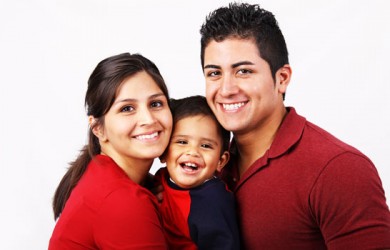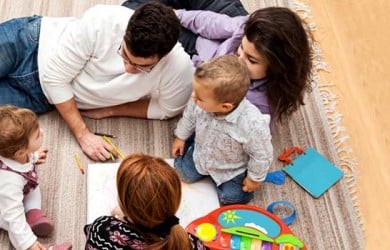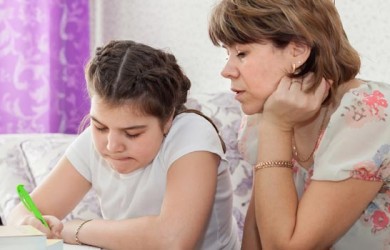How to Parent a Child With ADHD: 10 Helpful Tips

 Listen to this article
Listen to this articleRaising a kid with ADHD comes with its own set of challenges. However, tackling the situation with the proper techniques and support is possible. This guide provides ten insightful suggestions on how to parent a child with ADHD in a supportive and empowered atmosphere.
What is ADHD?
Attention Deficit Hyperactivity Syndrome, or ADHD, is a neurological disorder that shows impulsivity, extreme hyperactivity, and persistent inattention in children. This type of conduct negatively affects the child’s ability to operate daily.
Children with ADHD often find it difficult to organize themselves at home and adjust to school. Thus, how to parent a child with ADHD? The solution is to treat the illness with behavioral treatment methods, medicine, and sufficient assistance from the child’s immediate family and school surroundings.
8 symptoms of ADHD in children
ADHD symptoms in kids are several, and it is essential to know how to deal with a child with ADHD. Find them listed below.
1. Inattentive
Frequent symptoms of ADHD in kids are forms of inattentiveness. They require assistance and may regularly make thoughtless errors in assignments or other activities. They also often need help remembering regular activities and tasks and organizing their things and tasks.
2. Hyperactive
Hyperactivity is another prevalent characteristic of ADHD in toddlers and children. They frequently fidget and show signs of restlessness, which makes it difficult for them to remain sitting when necessary. It’s common to witness them running or climbing around.
3. Impulsive
Impulsivity is another one of the main signs of ADHD in children. They often behave impulsively, displaying annoyance and repeatedly cutting people off in discussions or activities. It might be challenging for them to wait for their time, and they may respond to questions before they are finished.
4. Emotion regulation
The most fundamental need, emotion regulation, is lacking in children with ADHD. These kids frequently exhibit erratic conduct along with mood swings and frustrations. They could have trouble adhering to guidelines and directives, often interpreted as a rebellious attitude.
5. Social and academic issues
The social and academic lives of children with ADHD can be significantly impacted. They find it a challenge to finish their projects and homework. These challenges may also manifest in social contexts, affecting their teamwork and peer relationship capacity. Rejection and social exclusion might ensue.
6. Difficulty planning
Children with ADHD usually have trouble organizing, planning, and managing their time. They also regularly need to do daily chores.
7. Presence of comorbidities
Anxiety and other common comorbidities frequently co-occur with ADHD. Adolescents with ADHD may be more likely to take drugs in such a situation. Learning difficulties are among the other prevalent comorbidities.
8. Family influence
ADHD has a significant influence on the family as well as the child. Family stress increases daily, and parents may struggle to control their child’s impulsive conduct. Relationships between siblings can sometimes be stressful, too.
How ADHD affects children: 5 ways
ADHD affects the child’s general well-being. Here are the most common ways one may encounter.
1. Behavioral difficulties
Children with ADHD frequently display challenging behaviors, including hyperactivity and restlessness. This may cause problems at home, in the classroom, and in their peer connections.
2. Academic difficulties
ADHD may cause problems in the classroom. Youngsters may struggle to maintain organization, pay attention to what they are doing, or finish schoolwork. These difficulties may cause the kid and their instructors to become frustrated, underachieve in the classroom, and receive poorer marks.
3. Problems with social contact
Social interactions are typically tricky for kids with ADHD to handle. They could find playing cooperatively, taking turns, or reading social signs challenging.
Their reckless actions might occasionally result in disputes with their peers. They could, therefore, feel alone or rejected, which could impact their general well-being and sense of self.
4. Issues with emotional regulation
One typical characteristic of ADHD is emotional dysregulation. Compared to their classmates, children with ADHD may feel strong emotions like grief, rage, or irritation more frequently. The instability of emotions can cause relationships with family members and peers to suffer.
5. Effect on one’s self-worth
Emotional dysregulation, behavioral issues, social interactions, and academic hurdles can significantly impact a child’s self-esteem. Youngsters with ADHD may feel inadequate or different from other kids, which can cause them to doubt their abilities and feel unworthy.
How to parent a child with ADHD: 10 helpful tips
ADHD kids can be managed if the right approach is followed. These are some great ADHD tips for parents.
1. Knowledge and comprehension
Begin by being as knowledgeable as you can about ADHD. Gaining knowledge about the illness, its signs, and its effects can enable you to offer more effective support.
You may learn about ADHD by reading books, attending seminars, or speaking with medical specialists. These resources can help you understand how to discipline a child with ADHD.
2. Dependable routine
Children who suffer from ADHD benefit from regularity and structure. Establish a regular daily routine that includes play, homework, supper, and bedtime hours. A schedule helps kids focus better and reduce anxiety by letting them know what to expect.
3. Clear communication
Communicate with your child straightforwardly and unambiguously while considering how to parent a child with ADHD. Avoid giving long or ambiguous directions, and be clear about your expectations.
If you’re worried about how to talk to a child with ADHD, realize that it’s critical to provide them with praise and positive reinforcement when they follow directions or finish activities.
4. Efficient control
While discipline is necessary, it should be applied consistently and fairly. So, how to help a child with ADHD? The best way is to ensure your youngster knows the rules and consequences by implementing a system of incentives and penalties.
Steer clear of punishing or severe tactics since they may have the opposite effect.
5. Divide tasks into manageable chunks
If the thought “I have no patience for my ADHD child” is constantly on your mind, the way out is to divide difficult tasks into more manageable, smaller steps. Complex tasks may overwhelm children diagnosed with ADHD. Tasks become more attainable as a result, and their confidence grows.
6. Use illustrations
Charts and lists are examples of visual aids that might be useful. By representing duties and expectations, these aids support your child’s organization and concentration.
7. Frequent exercise
It’s common for parents to worry about how to parent a child with ADHD. However, it would be best if you kept your child in getting regular exercise. Exercise reduces hyperactivity, enhances attention, and burns off extra energy. Sports, swimming, and even taking frequent walks may be helpful activities.
8. Wholesome eating
In your journey of how to parent a child with ADHD, a healthy diet is essential for kids with ADHD. Steer clear of processed meals and high sugar content, as these might aggravate symptoms.
Whole grains, lean meats, fruits, and vegetables are all part of their diet. Fish is a common source of omega-3 fatty acids, which some parents find beneficial.
9. Time management
Instil in your youngster the value of time management and organization. Utilize calendars, planners, and alarm clocks to assist them in adhering to their academic schedule and other obligations.
Watch this video to learn some key tips to learn how to manage your time better:
10. Seek expert assistance
If you’re still unsure how to parent a child with ADHD, you might want to consult a pediatrician, psychologist, or psychiatrist. They can direct your child’s use of medicine, behavioral therapy, and other therapies that could be suitable.
FAQs
These are some of the most common questions parents have regarding raising a kid with ADHD, along with insightful responses that should help them along the way.
-
Can my child with ADHD live a normal life?
Indeed, kids with ADHD may have happy, meaningful lives. They may effectively control their symptoms and accomplish their objectives with the proper care, encouragement, and direction. Early intervention, a regular schedule, and open communication can facilitate a happy and fulfilling life.
-
How can I help my child with ADHD develop friendships?
To assist your ADHD child in making friends:
– Promote social activities such as team sports and playdates.
– Give them chances to interact; when they do, acknowledge their accomplishments with praise.
– Creating a network of supporters might be beneficial as well.
-
How do I deal with the stress of parenting a child with ADHD?
Self-care is necessary to manage the stress of raising a kid with ADHD. Make your health a priority, get help from professionals, and join support networks.
To minimize confusion, keep your routine organized. Learn about attention deficit hyperactivity disorder (ADHD) and engage with your child with kindness and understanding.
-
What are some tips for self-care for parents of children with ADHD?
The best ways to help your child with ADHD are to make time for hobbies and relaxation, stay connected to other parents, and get expert assistance when necessary. Remain prepared, have patience, and establish reasonable expectations.
Put your mental and physical health first so that you can better support both yourself and your kid.
Summary
Raising a child with ADHD has its own set of obstacles, but you may support their success if you have the necessary patience, understanding, and tactics. Joining support groups and obtaining expert advice may be of great help.
Remember that you have help available on this path; you are not alone.
 Tips
Tips
Write your tip or submit a video tip
All tips are reviewed before the publishing.
Share this article on
Want to have a happier, healthier marriage?
If you feel disconnected or frustrated about the state of your marriage but want to avoid separation and/or divorce, the marriage.com course meant for married couples is an excellent resource to help you overcome the most challenging aspects of being married.

























 We'd love your feedback!
We'd love your feedback! Thanks for your feedback!
Thanks for your feedback!
